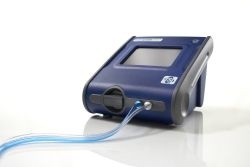Respiratory Protection
Respiratory protection for hospital staff is a critical issue. Surgical masks were at one time considered sufficient, but new evidence from the US Centers for Disease Control and Prevention (CDC) shows that they do almost nothing to protect the individual wearer. In response to the outbreak of Swine Origin Influenza Virus the CDC recommends all healthcare personnel to wear a fit-tested disposable N95 respirator or equivalent.

N95 respirators have emerged as the preferred and required method of respiratory protection for most hospital staff. The National Institute for Occupational Safety and Health (NIOSH), which is part of the CDC, certified N95 respirators/masks are designed to help provide respiratory protection for the wearer. The N95 respirator/mask has a filter efficiency level of 95% or greater against particulate aerosols free of oil when tested against a 0.3 micron particle. It is fluid resistant, disposable and may be worn in surgery. The "N" means "Not resistant to oil". The "95" refers to a 95% filter efficiency.
Of equal importance is hospital isolation room pressure, the CDC states that “Procedures that are likely to generate aerosols (e.g., bronchoscopy, elective intubation, suctioning, administering nebulized medications), should be done in a location with negative pressure air handling whenever feasible. An airborne infection isolation room (AIIR) with negative pressure air handling with 6 to 12 air changes per hour can be used. Air can be exhausted directly outside or be recirculated after filtration by a high efficiency particulate air (HEPA) filter. Facilities should monitor and document the proper negative-pressure function of AIIRs, including those in operating rooms, intensive care units, emergency departments, and procedure rooms.”
07.05.2009





